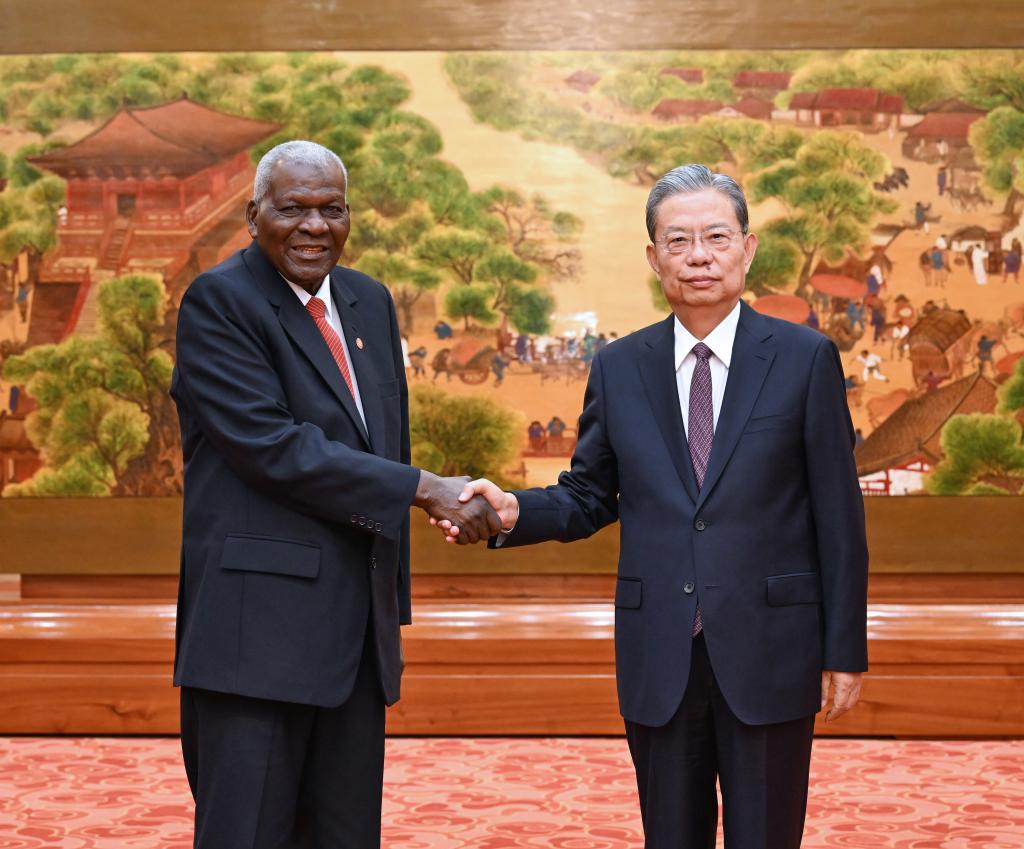

Zhao Leji, chairman of the National People's Congress Standing Committee, holds
talks with Esteban Lazo Hernandez, president of Cuba's National Assembly of People's Power, in Beijing, capital of China, Nov. 7, 2024. [Photo/Xinhua]
Zhao Leji, China's top legislator, and Esteban Lazo Hernandez, president of Cuba's National Assembly of People's Power, held talks on Thursday in Beijing, vowing to strengthen exchange in the area of rule-of-law development.
Noting that next year marks the 65th anniversary of diplomatic ties between China and Cuba, Zhao, chairman of the National People's Congress (NPC) Standing Committee, said China is willing to work with Cuba to implement the important consensus reached by the two countries' heads of state, continue deepening the special, friendly bilateral relations in the new era, and promote the steady, far-reaching construction of a community with a shared future between China and Cuba.
Zhao said China has always placed Cuba in a special position in its external relations, and is willing to deepen political mutual trust and strategic coordination with the country.
Zhao thanked Cuba for its firm support on the Taiwan question and other issues concerning China's core interests. He said China supports Cuba firmly in its just struggle against sanctions, blockades and external interference, and will continue providing Cuba with assistance and support within its own capacity.
China is ready to strengthen practical cooperation with Cuba in various fields, make good use of coordination mechanisms under the Belt and Road, and deepen cooperation in such fields as agriculture, tourism, sports, biotechnology, clean energy, and information and communication, Zhao said. China is also prepared to translate the high-level political mutual trust between the two countries into further practical cooperation results, he added.
The NPC of China is willing to work with Cuba's National Assembly of People's Power to implement the cooperation agreement between the legislative bodies of the two countries, he said. He called on both sides to strengthen coordination and speak with one voice on safeguarding each other's core and major interests, and to undertake dialogue and exchange in the areas of socialist-democracy and rule-of-law development, poverty reduction and public security. The two nations should also promote exchange in the fields of education, culture, youth and media, and consolidate the popular public support for the China-Cuba friendship.
Zhao also said that the legislatures of the two countries can promote the exchange of experience in strengthening key legislation areas and improving the quality of legislation.
Lazo said that Cuba adheres firmly to the one-China principle, supports the Global Development Initiative, the Global Security Initiative and the Global Civilization Initiative, and is willing to learn from China's experience in reform and opening-up, as well as in party construction.
Noting that China's rapid development is a growing force for world peace and has brought development opportunities to Latin America and the Caribbean, Lazo said the National Assembly of People's Power is willing to strengthen its friendly exchange with China's NPC, advance exchange and mutual learning in rule-of-law development and other areas, and give play to the positive role of legislative bodies in enhancing bilateral friendships.
Zhao and Lazo signed a cooperation agreement between their two legislative bodies following their meeting.
